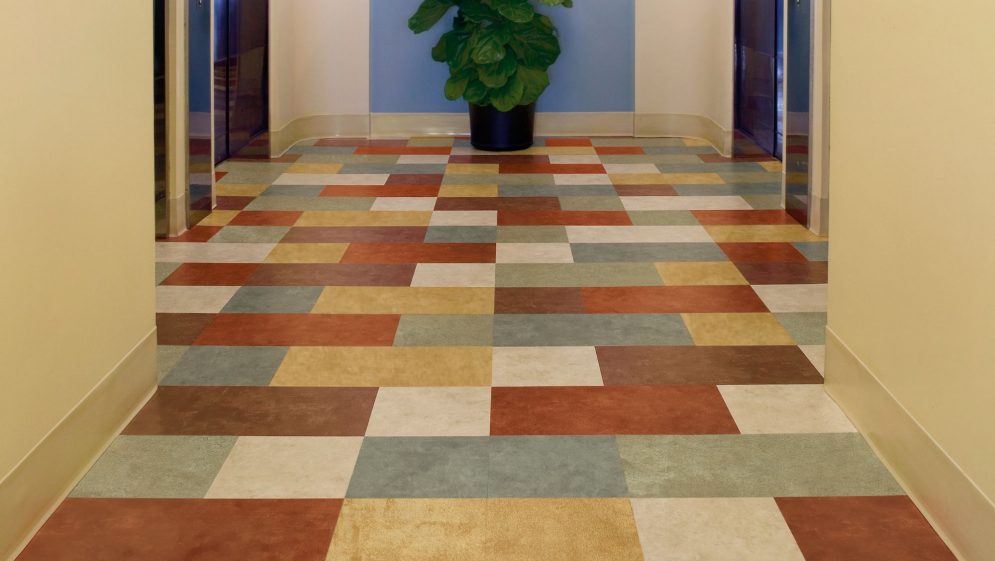Is Moisture Destroying Your Flooring System?
When flooring problems occur, moisture is often the culprit. Moisture control is one of the most crucial, yet most overlooked, elements of any floor’s success over time, and can be a challenge everywhere no matter the climate. When moisture issues begin to occur, multiple things can happen including adhesive deterioration and failure, loose flooring tiles, peaking and curling, open seams, bad or musty odors and even pest infestation. Moisture problems can occur with almost any kind of flooring, but non-breathable finished floors (vinyl composition tile, unbacked sheet vinyl, carpet tile, and rubber flooring) are particularly vulnerable.
Problems with moisture usually begin in the concrete or wood substrates. When flooring is installed over wood, the problem usually stems from some sort of flooding, a water leak, or the underlayment may have been wet when the floor was installed. When the moisture is in the concrete, the slab was most likely not allowed to dry sufficiently prior to installing the floor covering. Regardless of the subfloor, the moisture can cause alkali to build up and damage the flooring. It is crucial that installers use a moisture meter prior to putting flooring on any surface, as most problems can be avoided if the surface is properly tested in advance.

How to Prevent a Moisture Problem
First, it’s important to not to just take a reading just from the surface of the material. This can be a misleading read as the surface may be dry because of low humidity. Though the subfloor may not appear wet or damp, the real problem usually lies below the surface material. Taking these steps before installation will help to avoid any problems once the floor is in:
- Use an electrical moisture meter with direct contact electrodes for the most accurate results.
- Perform vapor emission tests. According to concreteconstruction.net, there are two tests that can be performed.
- “Standard Test Method for Indicating Moisture in Concrete by the Plastic Sheet Method,” a plastic sheet is tightly taped to the concrete. After 72 hours, a humidity reading is taken under the plastic with a dew point hygrometer. Determining what humidity level is acceptable depends upon the surface treatment to be applied. For flooring, the relative humidity must usually be below 80%, and the floor under the plastic should be free of dampness, discoloration, or damp odors.”
- “A second direct test, ASTM F 1869, “Standard Test Method for Measuring Moisture Vapor Emission Rate of Concrete Subfloor Using Anhydrous Calcium Chloride,” was standardized in the 1990s by the Subcommittee on Practices of the Committee on Resilient Floor Coverings. This test method to obtain a quantitative value indicating the rate of moisture vapor emission from the surface of a concrete floor and whether or not that floor is acceptable to receive resilient floor covering. The moisture vapor emission rate only reflects the condition of the concrete floor at the time of the test.”
- If the subflooring is wood, most hardwood suppliers will recommend a minimum of 20 readings per 1000 sq. ft. and average the results. (This is also an excellent rule to use on other types of flooring as well.)

What happens if there is already moisture under my flooring?
If your test results prove that moisture exists, it is prudent to take the tests for a second time to confirm your findings. It is then important to determine the source of moisture and take steps to rectify that situation. This may mean making sure the concrete slab has cured, finding leaks underneath the slab or substrate, or diverting and water flow away from the building. Depending on the severity of the problem, it may require changing your flooring surface and using a high moisture adhesive, or a full remediation of the subfloor may be necessary.
Continental’s floor covering experts can help guide you through available choices for your requirement. From moisture testing to installing your new floor covering, we can help! We have water resistant, floating and breathable floors – all great options for a facility with a high moisture rating! We offer materials only (DIY) or complete installation services, Continental Flooring is here for you every step of the way.
One call does it all!




